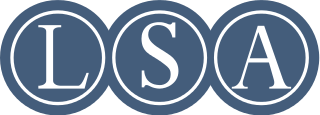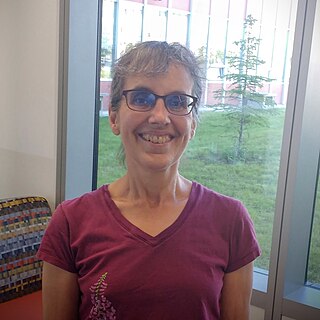Related Research Articles

The Linguistic Society of America (LSA) is a learned society for the field of linguistics. Founded in New York City in 1924, the LSA works to promote the scientific study of language. The society publishes three scholarly journals: Language, the open access journal Semantics and Pragmatics, and the open access journal Phonological Data & Analysis. Its annual meetings, held every winter, foster discussion amongst its members through the presentation of peer-reviewed research, as well as conducting official business of the society. Since 1928, the LSA has offered training to linguists through courses held at its biennial Linguistic Institutes held in the summer. The LSA and its 3,600 members work to raise awareness of linguistic issues with the public and contribute to policy debates on issues including bilingual education and the preservation of endangered languages.
Larry M. Hyman is Distinguished Professor Emeritus of Linguistics at the University of California, Berkeley. He specializes in phonology and has particular interest in African languages.

Sarah Grey Thomason is an American scholar of linguistics, Bernard Bloch distinguished professor emerita at the University of Michigan. She is best known for her work on language contact, historical linguistics, pidgins and creoles, Slavic Linguistics, Native American languages and typological universals. She also has an interest in debunking linguistic pseudoscience, and has collaborated with publications such as the Skeptical Inquirer, The Encyclopedia of the Paranormal and American Speech, in regard to claims of xenoglossy.
Marianne Mithun is an American linguist specializing in American Indian languages and language typology. She is a professor of linguistics at the University of California at Santa Barbara, where she has held an academic position since 1986.
Heidi Britton Harley is a Professor of Linguistics at the University of Arizona. Her areas of specialization are formal syntactic theory, morphology, and lexical semantics.
Joan Wanda Bresnan FBA is Sadie Dernham Patek Professor in Humanities Emerita at Stanford University. She is best known as one of the architects of the theoretical framework of lexical functional grammar.
Elizabeth Closs Traugott is an American linguist and Professor Emerita of Linguistics and English, Stanford University. She is best known for her work on grammaticalization, subjectification, and constructionalization.
Thomas A. Wasow is an American linguist, the Academic Secretary to the University at Stanford University. He is also Professor of Linguistics, emeritus, and the Clarence Irving Lewis Professor of Philosophy, emeritus.
Penelope "Penny" Eckert is Albert Ray Lang Professor Emerita of Linguistics at Stanford University. She specializes in variationist sociolinguistics and is the author of several scholarly works on language and gender. She served as the president of the Linguistic Society of America in 2018.
Gillian Elizabeth Sankoff is a Canadian-American sociolinguist, and professor emerita of linguistics at the University of Pennsylvania. Sankoff's notable former students include Miriam Meyerhoff.

Keren Rice is a Canadian linguist. She is a professor of linguistics and serves as the Director of the Centre for Aboriginal Initiatives at the University of Toronto.
Ellen Broselow is an experimental linguist specializing in second language acquisition and phonology. Since 1983, she has been on the faculty of SUNY Stony Brook University, where she has held the position of Professor of Linguistics since 1993.
Judith Tonhauser is a Professor of English Linguistics at the University of Stuttgart.
Andries W. Coetzee is Professor of Linguistics, and served as Director of the African Studies Center (2019-22) at the University of Michigan. Since receiving his PhD in Linguistics from the University of Massachusetts Amherst in 2004 he has been a major contributor in research in the fields of Phonetics and Phonology. His career has been spent teaching in South Africa and at the University of Michigan, and being heavily involved with the Linguistics Institute of the Linguistic Society of America. In 2011 he received the first ever Early Career Award from the Linguistic Society of America, and in 2015 was inducted as a fellow of this Society.
Donca Steriade is a professor of Linguistics at MIT, specializing in phonological theory.
Sonja L. Lanehart is an American linguist and professor of linguistics in the College of Social and Behavioral Sciences at the University of Arizona who has advanced the study of language use in the African American community. Her work as a researcher, author, and editor includes African American English, education, literacy, identity, language variation, women's languages, intersectionality, and inclusivity within the African American community. Lanehart's sociolinguistic orientation prioritizes language as a phenomenon influenced by sociocultural and historical factors. She also utilizes the perspectives of Critical Race Theory and Black feminism in her work. Lanehart was the Brackenridge Endowed Chair in Literature and Humanities at the University of Texas at San Antonio from 2006 to 2019, and was selected by the Linguistic Society of America as a 2021 Fellow.
Amy Rose Deal is associate professor of linguistics at the University of California, Berkeley. She works in the areas of syntax, semantics and morphology, on topics including agreement, indexical shift, ergativity, the person-case constraint, the mass/count distinction, and relative clauses. She has worked extensively on the grammar of the Sahaptin language Nez Perce. Deal is Editor-in-Chief of Natural Language Semantics, a major journal in the field.
Kristen Syrett is a linguist whose work focuses on language acquisition, psycholinguistics, semantics, and pragmatics.
Fellow of the Linguistic Society of America (LSA) is an honor accorded by the Linguistic Society of America (LSA) to distinguished members of the society. LSA Fellows are "members of the Society who have made distinguished contributions to the discipline" and are selected annually by the LSA Executive Committee based on nominations from the general society membership.
References
- ↑ "Anne Harper Charity Hudley". Stanford Profiles. Retrieved January 21, 2022.
- ↑ "Doctoral Alumni | Department of Linguistics". www.ling.upenn.edu. Retrieved 2021-03-08.
- ↑ "Sharpe Community Scholars Program". College of William and Mary. Archived from the original on March 26, 2015. Retrieved March 28, 2015.
- ↑ "CharityHudley.CV.pdf" (PDF). Retrieved July 19, 2017.
- ↑ "Dr. Anne Harper Charity Hudley". William and Mary People. College of William and Mary. Retrieved March 28, 2015.
- ↑ "W&M Scholars Undergraduate Research Experience (WMSURE)" . Retrieved March 28, 2015.
- ↑ "Dr. Anne Harper Charity Hudley". William and Mary People. College of William and Mary. Retrieved March 28, 2015.
- ↑ "BSU and Chancellor Yang Collaborate to Establish Institutional Changes". The Daily Nexus. Retrieved 2017-01-08.
- ↑ "Anne Charity Hudley's transition to the University of California, Santa Barbara". Valuable Voices. 2016-12-12. Retrieved 2017-01-08.
- ↑ "Center for Applied Linguistics Board of Trustees: Anne Harper Charity Hudley" . Retrieved March 11, 2022.
- ↑ "The sound of inclusion: Why teachers' words matter". Salon. 2017-08-17. Retrieved 2019-04-12.
- ↑ Hudley, Anne H. Charity (2014-10-14). "Which English You Speak Has Nothing to Do With How Smart You Are". Slate Magazine. Retrieved 2019-04-12.
- ↑ "Anne Charity Hudley (CV)" (PDF). Retrieved March 28, 2015.
- ↑ "LSA to Hold Special Session at 2018 Annual Meeting | Linguistic Society of America". www.linguisticsociety.org. Retrieved 2019-04-12.
- ↑ "LSA Members Elect New Officers, Editor of Language | Linguistic Society of America". www.linguisticsociety.org. Retrieved 2017-01-08.
- ↑ "Editorial Information | Linguistic Society of America". www.linguisticsociety.org. Retrieved 2015-08-20.
- ↑ "Language and Linguistics Compass - Editorial Board". Wiley Online Library. doi:10.1111/(ISSN)1749-818X.
{{cite journal}}: Cite journal requires|journal=(help) - ↑ "The American Dialect Society: American Speech Editorial Board" (PDF). Retrieved August 20, 2015.
- ↑ "Linguistics and Community Engagement: Keeping it Real". Linguistic Society of America official YouTube channel. LSA Summer Institute at the University of Michigan. July 9, 2013. Retrieved March 28, 2015.
- ↑ "Red River Radio: Anne Harper Charity Hudley" . Retrieved March 28, 2015.
- ↑ "Episode 184: We Do Language featuring Anne Charity Hudley". Talk the Talk. Retrieved March 28, 2015.
- ↑ Harmon, Amy (November 2021). "BIPOC or POC? Equity or equality? The debate over language on the left". New York Times. Retrieved March 11, 2022.
- ↑ "Why we can't stop fighting about cancel culture". Vox. 30 December 2019. Retrieved March 11, 2022.
- ↑ "2021 AAAS Fellows | American Association for the Advancement of Science". www.aaas.org.
- ↑ "Linguistic Society of America List of Fellows by Year" . Retrieved 11 March 2022.
- ↑ "Toward Racial Justice in Linguistics: Interdisciplinary Insights into Theorizing Race in the Discipline and Diversifying the Profession" . Retrieved June 10, 2020.
- ↑ "We Do Language". 30 April 2013. Retrieved March 28, 2015.
- ↑ "Understanding English Language Variation in U.S. Schools". Valuable Voices. 22 May 2010. Retrieved March 28, 2015.